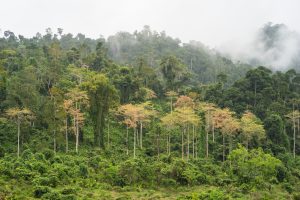Human rights groups have expressed their fears for a Montagnard refugee and political activist who was arrested in Thailand earlier this week and is at risk of being deported to his home country, where he faces a 10-year prison sentence on terrorism charges.
According to the advocacy group Human Rights Watch (HRW), Y Quynh Bdap was arrested by Thai immigration police on June 11, and is currently being detained at the Bangkok Remand Prison pending an extradition trial.
The 32-year-old has been living in Thailand since 2018 and has been recognized as a refugee by the United Nations refugee agency, UNHCR. He is the co-founder of Montagnards Stand for Justice, which campaigns for political and religious freedom for the Montagnards. The French term includes the various indigenous minority groups living in Vietnam’s Central Highlands, many of whom are Protestant Christians.
The Vietnamese government has requested his extradition in connection with last year’s attacks on two government offices in the Central Highlands province of Dak Lak. The attacks, which occurred in the early hours of June 11 in Cu Kuin district, left nine people dead, including four police officers, two commune officials, and three civilians.
Despite being outside the country, Y Quynh Bdap was accused of helping foment the attack and was sentenced to 10 years prison in absentia.
He was one of 100 individuals arrested in connection with the attacks, who were tried en masse over four days in January. At the conclusion of the trial, 10 were sentenced to life in prison on terrorism charges, with the remainder handed prison sentences ranging from three-and-a-half years to 20 years.
The motivation and goal of the Dak Lak attackers remain unclear, but the Central Highlands has seen periodic protests and clashes between indigenous minority groups and the central state, particularly over land disputes, economic difficulties, and crackdowns on unregistered evangelical churches. There are also deeper currents of mistrust dating back to the Vietnam War, when many Montagnards fought alongside U.S. and South Vietnamese forces. (Many were subsequently resettled in the U.S., especially in North Carolina in the vicinity of Fort Bragg, the home of the U.S. 5th Special Forces Group that helped train Montagnard forces.)
The Vietnamese government’s pursuit of Y Quynh Bdap reflects its belief that the attacks were part of an insurrectionary plot directed by Montagnard diaspora groups operating abroad, particularly in the United States, where many fled after the communist victory in 1975. In March, it listed two overseas-based political groups, including Y Quynh Bdap’s Montagnards Stand for Justice, as “terrorist organizations.”
Over the past few days, human rights advocates including HRW and Mary Lawlor, the U.N. special rapporteur for human rights defenders, have called on the Thai authorities to ensure that he is not deported.
“Returning the Vietnamese activist Y Quynh Bdap to Vietnam would place him in grave danger,” Elaine Pearson, HRW’s Asia director, said in a statement yesterday. “Thai authorities should recognize Y Quynh Bdap’s refugee status, release him, and ensure he’s not put in harm’s way.”
Unfortunately, while Thailand has long served as a sanctuary for political exiles from across Southeast Asia, particularly Myanmar, Thailand, Vietnam, and Laos, Bangkok has showed an increasing willingness to detain and deport dissidents from foreign countries. Conversely, these countries’ governments have agreed to do the same for the growing number of Thai dissidents who fled the country after the 2014 coup.
In a report published earlier this year, HRW described this quid pro quo arrangement as a “swap mart” of refugees and dissidents. The report noted that a growing number of exiles “have faced surveillance, violence, abductions, enforced disappearances, and forced returns facilitated by the government of Thailand.” At the same time, “Thai authorities have engaged in acts of transnational repression against exiled Thai activists in Southeast Asia.”
Most of these cases involved dissidents from Cambodia who fled to Thailand due to the country’s intensifying political crackdown over the past decade. Most recently, in February of this year, Thai authorities arrested three exiled Cambodian political activists in Thailand, ahead of state visit by Prime Minister Hun Manet, earning praise from the Cambodian leader.
As HRW notes, Thailand’s recently passed Act on Prevention and Suppression of Torture and Enforced Disappearances prohibits the deportation or extradition of any person who could face “torture, cruel, inhuman, or degrading treatment, or enforced disappearance.” But the law has never been more than a weak constraint on Thai governments’ power, and Y Quynh Bdap’s case will provide a test of whether this particular legislation has any bearing on Bangkok’s behavior.

































